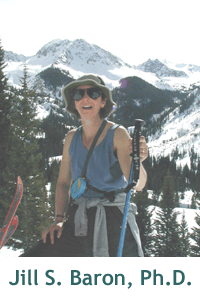Jill S. Baron
From an “Ecologist Directory” maintained by the ESA Education Office about 2004-2011. Profile circa 2004.
Degree Ph.D. 1991 (Colorado State University)
Department Natural Resource Ecology Laboratory USGS
Organization Colorado State University
Describe your route to a career in (or using) ecology. What challenges did you need to overcome? What was your training, and what positions have you held?
I became interested in ecology in high school, due to a wonderful biology teacher. He actively encouraged us to join the National High School Biology Honor Society, which required all kinds of service to local elementary schools (teaching, leading field trips). He also organized trips for us, locally in Wisconsin, and to exotic places like Arizona mountains and deserts and the Georgia coast, in order to study and think about other ecosystems. This teacher instilled a life-long respect in us for the environment and a desire to protect natural environments and environmental processes. Even with his guidance, I never though you could make a career out of ecology, though.

I was extremely lucky to have opportunities and support from the Park Service and from Susan Bratton, my supervisor. As a seasonal employee I was able to conduct research and carry it through to publications and presentations. My master’s research in Gulf Islands National Seashore was sponsored by Park Service, as was my doctoral work in Rocky Mountain National Park. The biggest challenge to a park service employee is moving from seasonal to permanent employment. My break came when I was hired permanently into the Washington Office. Not enjoying the big city, however, I wrote a (successful) proposal to do research on acid rain effects to high elevation Rocky Mountain lakes, and have been doing similar work in Colorado since 1981. My undergraduate degree in botany with a minor in geology served as a great background for ecological research. A masters in plant ecology taught me how to make mistakes, one of which was choosing plant ecology as a career. I didn’t like it. Luckily, exposure to air and water quality issues while in Washington convinced me biogeochemistry was far more exciting, and my Ph.D. is in ecosystem ecology.
The titles of positions I’ve held reflect government-speak more than work actually accomplished: I’m currently a research ecologist, but have done the same work, essentially, with titles such as environmental specialist, air quality program specialist, program analyst, technician, and of course, volunteer. I can’t say I’ve overcome any great challenges that hard work and optimism didn’t resolve. The best luck of all has been to remain a government employee – a public servant in the best sense of the word – while holding a faculty position at Colorado State University. My research in ecosystem ecology has continued successfully while the agencies I work for have changed. In 1994 the Department of Interior created a new short-lived agency called the National Biological Survey, to conduct objective research into natural resource issues of the country. I was an NBS scientist for several years until NBS became a new division of the U.S. Geological Survey – the Biological Resources Division. The research I have done has not been harmed by these agency changes, and in fact has grown, in large part because of the intellectual stimulation of being a part of a large interdisciplinary research organization, the Natural Resource Ecology Laboratory at Colorado State, where students and faculty work on complex topics by using an systems approach.
After switching majors from pre-med (through medieval literature) to botany, I got a volunteer research position in Great Smoky Mountains National Park, with the idea of becoming a park ranger. At least, I thought, I’d have a job that would allow me to be outside. Instead, I found one could build a career as a scientist in the Park Service. I’m currently an ecosystem ecologist with the U.S. Geological Survey, where I look at the ecological and biogeochemical effects of air pollutants on ecosystems of the Rocky Mountains. Increasingly, I and my students also address climate variability and other human-caused disturbances, such as land use change, water resource manipulation, and climate change on ecosystems. The work involves the perfect mix of field work in the Rocky Mountains, analytical work in the laboratory and collaboration with people of all kinds of background.
What key advice would you offer a student today?
Try lots of different activities – it’s the only way to decide if you and the career are a good fit. Even if you find that good fit, change focus every so often to stay fresh and interested. Work hard, even in volunteer positions, and take advantage of local experts, many of whom will be wise in local knowledge although not necessarily in book-learning. Above all, have fun – if it’s not fun and personally rewarding, you’re in the wrong place.